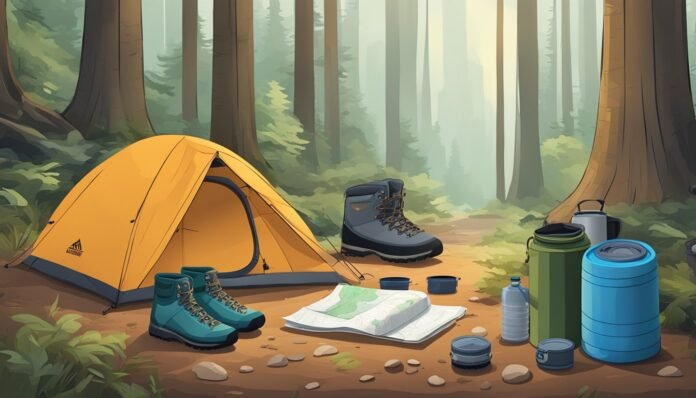Backpacking is an exciting way to explore the great outdoors and connect with nature. Whether you’re a beginner backpacker or have some experience, choosing the right backpacking gear is essential for a successful and enjoyable trip. With so many options available, it can be overwhelming to know where to start.
As a beginner backpacker, it’s important to focus on the essentials when it comes to backpacking gear. This includes a backpack, tent, sleeping bag, sleeping pad, and cooking equipment. Proper preparation and research can go a long way in ensuring that you have the right gear for your trip.
Essential Backpacking Gear for Beginners
When it comes to backpacking, having the right gear can make or break your trip. As a beginner, it can be overwhelming to decide what to pack, but with a little guidance, you can ensure that you have everything you need without overpacking.
Choosing the Right Backpack
Your backpack is arguably the most important piece of gear you’ll need. You’ll want to choose a backpack that fits your body well and has enough capacity to hold all of your gear. Look for a backpack with adjustable straps and a hip belt to evenly distribute weight. A backpack with a capacity of 50-65 liters is a good place to start for a weekend trip.
Sleep System: Sleeping Bag and Pad
A good night’s sleep is crucial when backpacking. You’ll need a sleeping bag that is appropriate for the temperature and weather conditions of your trip. Look for a sleeping bag with a temperature rating that matches the lowest temperature you expect to encounter. A sleeping pad will provide insulation and cushioning, making your sleep more comfortable.
Shelter Options: Tents and Alternatives
Your shelter will protect you from the elements and provide a place to sleep. A backpacking tent is a popular option for its lightweight and compact design. Look for a tent that is appropriate for the number of people in your group and has a rainfly to keep you dry. If you’re looking for a more budget-friendly option, consider a tarp or bivy sack.
Remember to always consult a backpacking checklist to ensure you have all the necessary gear before embarking on your trip. With the right gear, you’ll be able to enjoy the great outdoors with ease and comfort.
Safety, Comfort, and Sustenance
When it comes to backpacking, your safety, comfort, and sustenance are of utmost importance. In this section, we will cover the essentials you need to consider to ensure a successful and enjoyable trip.
Footwear and Clothing Essentials
Your footwear and clothing are crucial for your comfort and safety on the trail. Invest in a good pair of hiking boots that fit well and provide ample support and traction. Don’t forget to wear moisture-wicking socks to prevent blisters and keep your feet dry.
Pack appropriate clothing for the weather conditions you may encounter, including a rain jacket for unexpected rain showers. Layering is key for regulating your body temperature, so pack lightweight and breathable clothing that can be easily added or removed.
Navigation and Tools
Navigating the trail is essential for your safety and enjoyment. Bring a map and compass, and make sure you know how to use them. A GPS device can also be helpful, but don’t rely on it entirely.
Pack essential tools such as a knife, multi-tool, and headlamp with extra batteries. These tools can be useful in a variety of situations, from preparing food to setting up camp in the dark.
Food, Water, and Kitchen Supplies
Proper hydration and nutrition are essential for your health and energy on the trail. Bring a water filter or purification tablets to ensure access to clean water sources. Pack a lightweight stove, fuel, and utensils for cooking and preparing meals.
Choose lightweight and nutrient-dense backpacking food such as energy bars, dehydrated meals, and trail mix. Pack enough food for the duration of your trip, plus a little extra in case of unexpected delays.
In conclusion, proper preparation and planning can make all the difference in your backpacking trip. By considering these essentials for safety, comfort, and sustenance, you can enjoy your time on the trail to the fullest.
Frequently Asked Questions
What are the essential items to include in a beginner backpacking gear list?
When creating a beginner backpacking gear list, it’s important to prioritize the essentials. These include proper footwear, a well-fitting backpack, a comfortable sleeping bag, a lightweight tent, and a water filtration system. Other important items include a first aid kit, a headlamp, a map and compass, and appropriate clothing layers. As a beginner, it’s important to focus on getting the essentials first before investing in more specialized gear.
How can one select a backpack that is suitable for their body and trip duration?
When selecting a backpack, it’s important to consider both your body type and the duration of your trip. Look for a backpack that fits your torso length and hip size, and has adjustable straps to ensure a comfortable fit. Consider the capacity of the backpack, which should be appropriate for the length of your trip and the amount of gear you need to carry. It’s also important to consider the weight of the backpack itself, as a heavy pack can quickly become uncomfortable.
What are the ‘big three’ items in backpacking, and why are they important?
The ‘big three’ items in backpacking refer to your backpack, shelter, and sleeping system. These items are typically the heaviest and most important gear items in your pack, and are essential for a safe and comfortable trip. It’s important to invest in high-quality versions of these items, as they will impact your comfort and safety on the trail.
Can you recommend a comprehensive checklist for ultralight backpacking gear?
There are many comprehensive checklists available for ultralight backpacking gear, but it’s important to remember that what works for one person may not work for another. When creating a checklist, focus on the essentials and prioritize lightweight, multi-purpose items. Look for gear that is durable and high-quality, but also lightweight and packable. It’s also important to consider the specific requirements of your trip and adjust your gear list accordingly.
What should beginners know about the weight and functionality of backpacking gear?
As a beginner, it’s important to understand the impact of weight and functionality on your backpacking experience. Lightweight gear is essential for reducing the strain on your body and increasing your overall comfort on the trail. However, it’s important to balance weight with functionality and invest in high-quality gear that will perform well in a variety of conditions. It’s also important to consider the specific requirements of your trip and adjust your gear list accordingly.
Where can beginners find reliable information and advice on choosing their first backpacking gear?
There are many resources available for beginners looking to choose their first backpacking gear. Outdoor gear stores and websites often have knowledgeable staff who can offer advice and recommendations. Online forums and social media groups can also be a great resource for finding advice and connecting with other backpackers. It’s important to do your research and consider multiple sources of information before making any purchases.

